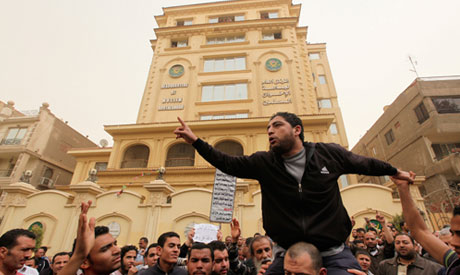 A Muslim Brotherhood source speaking on condition of anonymity has told Ahram Online that the "national dialogue" proposed by the National Alliance to Support Legitimacy (NASL), an Islamist umbrella group gathering supporters of ousted president Mohamed Morsi, is a result of "external pressure exerted on the group and their allies" to push "for integrating in the current political scene."
A Muslim Brotherhood source speaking on condition of anonymity has told Ahram Online that the "national dialogue" proposed by the National Alliance to Support Legitimacy (NASL), an Islamist umbrella group gathering supporters of ousted president Mohamed Morsi, is a result of "external pressure exerted on the group and their allies" to push "for integrating in the current political scene."
The source did not reveal the external forces pressuring the Alliance.
The NASL called Saturday for a national dialogue as a way out of the country's political strife, and in respect for "political plurality."
Their statement, entitled "A Strategic Viewpoint," states that Egypt needs a "serious discussion." This cannot happen, the alliance stated, until "the arrests, bloodshed, and hate speech" ends.
The source added that the appearance of Muslim Brotherhood and alliance leaders Mohmed Ali Beshr and Amr Darrag is confirmation of their assigned role in finding a way out of the current crisis, especially that they have been already in unofficial negotiations between a high ranking military figure that was a member of the Supreme Council of the Armed Forces (SCAF).
These talks, according to the source, have not yet materialised into a formal context.
Will Morsi be set aside?
For the first time, the Alliance's initiative for dialogue does not ask for the reinstatement of deposed president Morsi, which observers considered a tacit waiver of this requirement.
The MB source said that it is no longer a requirement within the Brotherhood that Morsi returns to power. Instead, according to the source, the Brotherhood is opening up to a new phase dedicated to constitutional legitimacy, through the political wing of the Brotherhood, the Freedom and Justice Party, and not the Brotherhood itself.
The source also affirmed that the Brotherhood will sit for negotiations at the "first serious opportunity," yet also expresses fears that dissatisfaction will arise among some of the Brotherhood's youth who believe that any attempt to negotiate with the current government is considered a betrayal of martyrs' blood.
Thus alliance leaders will have to convince members and allies first before making concessions to sustain the group itself, the source adds.
On the possibility of guarantees to push the talks forward in a clear context, the source said that there's a suggestion that Morsi signs a document that gives guarantees for the talks to go forward.
Political forces refuse
Meanwhile, Magdy Karar, a leading figure in the Alliance, told Ahram Online that there has not been any communications with political forces to explore their views on the Alliance's initiative, which Karar described as the Alliance's strategic attempt to create common ground between the various political forces, for the sake of Egypt's future.
Initial political responses to the alliance's initiative have near unanimously rejected the initiative as it does not acknowledge the 30 June revolution as a preliminary condition to start negotiations.
The grassroots Rebel Movement that called for the 30 June protests described the initiative as an attempt to obstruct the "roadmap" to democracy initiated 3 July by the army and a number of political and national Egyptian figures.
The initiative is not open-ended. The NASL has given the interim government two weeks to respond.
Minister of Social Solidarity Ahmed El-Borei stated earlier Sunday that the Egyptian government could agree to reconciliation with the Muslim Brotherhood if it accepts the transition roadmap as a pretext.



